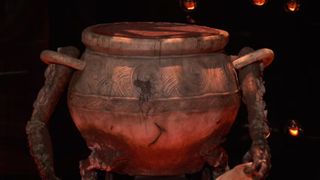The Game Awards is becoming the biggest single gaming event of the year
The Keighleyganza is now arguably the most important date in the industry's calendar, but not for the awards.

The Game Awards is inseparable from its founder, presenter, and all-round marketing machine Geoff Keighley. His willingness to turn any moment into a commercial opportunity has earned him a bad rap from elements of the gaming community. It's also one of the key elements of The Game Awards' gradual transformation into something much bigger than ever seemed possible when it was first announced in 2014.
Keighley has built a personal brand that is absolute catnip for publishers.
At that point I mainly knew Keighley from his history with GameSpot (where he delivered access like few others have) and the Spike Video Game Awards, which were a garish and more over-the-top form of what would follow. The Spike Awards had the commercials, it had ugly awards, and it was something of a minor event. Nothing close to what The Game Awards would become, but significant.
What seems most notable about them now is that they only existed because of Keighley. When he left, the network tried one show under a re-brand (VGX) with a new presenter, then dropped it.
2020 vision
The rise of The Game Awards is not just due to Keighley's comfortingly bland commercial sense, however, but the coincidence of the coronavirus pandemic and the absolute chaos it caused in the events sector—which, unlike many other businesses, is entirely dependent on people attending en masse.
The Game Awards was always conceived as an online-first show, and so was barely affected last year, at least for viewers. Whereas events as big as E3 (which Keighley publicly 'broke up' with in 2020), Gamescom, TGS, BlizzCon, and PAX struggled in different ways—and E3 made an absolute hash of it at first—The Game Awards were built for a world where everyone would be watching on screens. Spike was a network television station, but Keighley understood that the future wasn't about traditional methods of distribution but phones, tablets, PC, whatever screen there was.

Keighley has built a personal brand that is absolute catnip for publishers. Here is a known face who can put your game in front of millions of eyeballs and is going to stick to the script perfectly. It's self-perpetuating. With each big reveal Keighley has proven his suitability for another big reveal. 'Keighley will reveal it' is probably the most comforting reassurance an executive at a big publisher can have, because they know it's going to go as planned, and after each trailer he'll say "amazing" or "incredible new IP" before smoothly rolling on to the next. You cannot undervalue this stuff.
A scant decade ago I trawled the floors of shows like E3, Gamescom, and TGS, and competed with other journalists to be 'first' with the news or find something new. These events may return but that search never will: Game announcements are now utterly centralised, and everyone gets the information at the same time. The amounts of money involved mean that the kind of thing that used to go on in the industry—a little sneak-peek at an upcoming project, a background look at some games footage—is absolutely not worth the risk.
The biggest gaming news, reviews and hardware deals
Keep up to date with the most important stories and the best deals, as picked by the PC Gamer team.
But The Game Awards has no risk.
A reveal destination
So we come to this weird question: what exactly is The Game Awards? It is nothing new to point out that the awards are the least important part of it. It rushes through them apologetically between trailers and, frankly, the trophies are the last reason you're watching. That's a bit odd, isn't it: Few people watch The Game Awards because they're interested in the awards.
It has never been clearer that The Game Awards is not really an awards show.
We watch for the trailers, and this is where the pandemic seems to have really supercharged Keighley's operation. There's a funny parallel with his permanent bromance with Hideo Kojima, who loves Keighley because he'll say what Koj wants. Kojima lucked-out in making a game about social isolation and the environment just before the pandemic hit and everyone went into social isolation. Both benefited from this shift: Kojima because his prescience suddenly had a direct line to reality; Keighley because he had a platform ready to go while all around were flailing, and a board that pushed him. Taking inspiration from the big-ticket efforts that had got 'virtual audiences' right, like the Democratic National Convention and the Emmy Awards, The Game Awards were reconfigured as the ultimate reveal destination.
It is impossible to overstate how important Keighley's image has been to this: When events companies panicked at the pandemic, he was the first presenter they ran to, and of course he did an excellent job and hit all the notes the publishers wanted to see.

Look at the full list of everything announced during The Game Awards last night. There were an astonishing 48 trailers, not all of them for brand new games admittedly, but it shows what this event is going to be now. It has never been clearer that The Game Awards is not really an awards show, and I genuinely don't think Keighley, commercially minded as he is, set out to build this.
Instead there's an odd confluence of circumstances: The pandemic, other events failing to do anything decent virtually, and Keighley's safe hands. These are what has turned The Game Awards from the weird soup of award and trailer it always was, and Spike was to be fair, into a genuine calendar event for the industry, one with more and bigger announcements than Gamescom. There is this tension between celebration and promo, which can be summed up in Elden Ring winning the most anticipated game award this year and last year while also giving the show its big reveal trailers at the exact same time.
Winner take all
As more and more studios have come to see TGA as the best target for their video asset, the show has become too multipurpose, a catch-all for celebrating the medium, advertisement, reveals, and the closest thing to unified awards the industry has. And last night, the show was, for a moment, an awkward context for acknowledging the still-unfurling issue of harassment in the games industry.
Watching Keighley, a man allergic to taking sides, move from an initially 'we are neutral' position to vaguely criticising Activision Blizzard by saying they'd have no involvement. He can't ignore public sentiment, and so the show featured a generic condemnation of harassment without ever saying anything specific. Then moving onto another trailer from Quantic Dream, no less, which has faced its own allegations of harassment.
"We should not and will not tolerate any abuse, harassment or predatory practices by anyone, including our online communities," Keighley said. "Tonight I call on everyone to build a better, safer videogame industry. Speak out online, vote with your time and with your dollars. Empower these world-builders who are creating the future of all entertainment."
The Game Awards feels like it should be half as long as it is, and cut out the awards and everything else and just serve up the trailers.
It's the statement you expect from a producer who doesn't want to take any position that will threaten valuable industry relationships, putting the responsibility to stop harassment on the people who buy and play games, rather than the companies concerned. That's where the problem lies, not in whether any individual player chooses to buy Call of Duty: Vanguard.
The Game Awards feels like it should be half as long as it is, and cut out the awards and everything else and just serve up the trailers. That's what it has become: The true digital E3, the publishers' route to the consumer. Obviously Keighley alone cannot be credited with all of this, but the abject offerings of the traditional big events—E3, Gamescom, TGS—have given The Game Awards more credence. There is no two ways about this: The Game Awards has began to eat their lunch and drink their milkshake on its way to becoming the biggest single games event of the year.
Rich is a games journalist with 15 years' experience, beginning his career on Edge magazine before working for a wide range of outlets, including Ars Technica, Eurogamer, GamesRadar+, Gamespot, the Guardian, IGN, the New Statesman, Polygon, and Vice. He was the editor of Kotaku UK, the UK arm of Kotaku, for three years before joining PC Gamer. He is the author of a Brief History of Video Games, a full history of the medium, which the Midwest Book Review described as "[a] must-read for serious minded game historians and curious video game connoisseurs alike."
Most Popular

